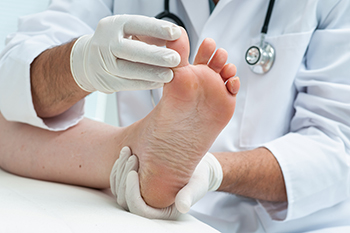
Psoriasis and athlete's foot are two distinct conditions that can affect the feet, but they differ significantly in cause, symptoms, and treatment. Psoriasis is an autoimmune disorder causing thick, scaly, and often itchy patches of skin. It is not contagious and may be triggered by stress, genetics, or environmental factors. In contrast, athlete's foot is a contagious fungal infection caused by dermatophytes thriving in warm, damp environments like locker rooms and shoes. It presents as red, itchy, peeling skin, often between the toes. Prevention varies by condition. Psoriasis management includes avoiding triggers and keeping skin moisturized, while athlete's foot requires keeping feet dry, using antifungal powders, and wearing breathable footwear. Treatments also differ. Psoriasis is managed with topical steroids or systemic medications, while athlete's foot responds to antifungal creams. If you are experiencing either of these foot problems, it is suggested that you schedule an appointment with a podiatrist who can diagnose and tailor treatment care effectively.
Athlete’s foot is an inconvenient condition that can be easily reduced with the proper treatment. If you have any concerns about your feet and ankles, contact one of our podiatrists from Grobowski Foot & Ankle. our doctors will treat your foot and ankle needs.
Athlete’s Foot: The Sole Story
Athlete's foot, also known as tinea pedis, can be an extremely contagious foot infection. It is commonly contracted in public changing areas and bathrooms, dormitory style living quarters, around locker rooms and public swimming pools, or anywhere your feet often come into contact with other people.
Solutions to Combat Athlete’s Foot
- Hydrate your feet by using lotion
- Exfoliate
- Buff off nails
- Use of anti-fungal products
- Examine your feet and visit your doctor if any suspicious blisters or cuts develop
Athlete’s foot can cause many irritating symptoms such as dry and flaking skin, itching, and redness. Some more severe symptoms can include bleeding and cracked skin, intense itching and burning, and even pain when walking. In the worst cases, Athlete’s foot can cause blistering as well. Speak to your podiatrist for a better understanding of the different causes of Athlete’s foot, as well as help in determining which treatment options are best for you.
If you have any questions please feel free to contact one of our offices located in Bellevue, Seattle, and Issaquah, WA, . We offer the newest diagnostic and treatment technologies for all your foot and ankle needs.
